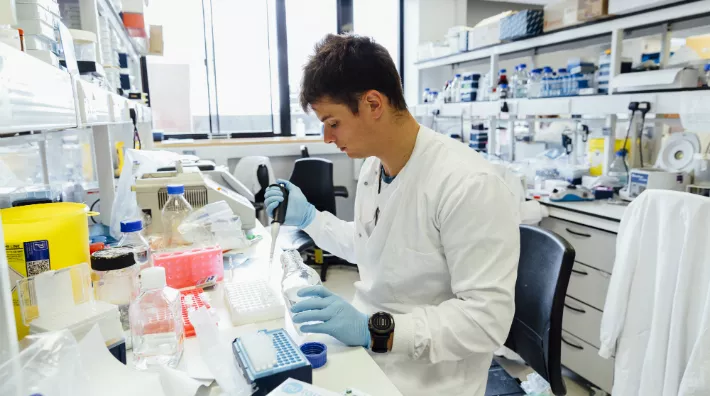
This year marks the 100-year anniversary of the discovery of insulin, but a century later, it remains the only treatment option for people with type 1 diabetes. However, change is on the horizon. New results from a landmark trial reveal that an immunotherapy drug can delay type 1 diabetes by an average of three years.
In 2019, researchers from the international TrialNet group found that an immunotherapy drug called Teplizumaub could delay a diagnosis of type 1 diabetes by two years, in people at high risk of developing the condition. It was a breakthrough moment, showing for the first time that it’s possible to intervene in the progression of type 1 diabetes.
Today, the researchers have revealed their latest results. They checked on the participants six years after they had their original treatment and found that the drug is continuing to have a positive effect. Those given Teplizumab were less likely to be diagnosed with type 1 diabetes than a comparison group who were given a dummy (placebo) drug.
Extra time free from diabetes
The latest result shows that 78% of people at high risk of developing type 1 diabetes in the placebo group were diagnosed with the condition during the trial. This compares to 50% of those who were treated with the drug. The study identified who is at higher risk of diabetes through a blood test that looks at genetics and presence of certain antibodies in the blood.
The average time for people in the placebo group to develop type 1 diabetes was two years, while the average time in those taking Teplizumab was five years. That’s an extra three years free from type 1 diabetes. This means no need for insulin, blood sugar testing, and the worry of future complications.
Checking in on the pancreas
The TrialNet team also studied the participants’ insulin production before and after treatment. Before any treatment was given, insulin levels were found to be decreasing at similar rates for everyone. But three months after receiving Teplizumab, there was a dramatic reversal of this loss of insulin production. For people in the placebo group, insulin production continued to fall. This suggests the drug is helping to preserve beta cell function, which produces insulin.
The researchers will continue to follow people on the study. They want to track how long the drug could delay type 1 diabetes for and see if they can predict which people are most likely to benefit from it.
Researchers are also testing Teplizumab with people who’ve just been diagnosed with type 1 diabetes. They want to see if it can preserve their remaining insulin-producing cells and help them produce their own insulin for longer.
When could it be made available?
Following these landmark findings, regulatory bodies in the USA are now reviewing the evidence to decide if Teplizumab should be licensed for use in people at risk of type 1 diabetes. A decision is expected later this year and we’ll keep you updated. If the therapy is licensed for use in the USA, it will still need to be licensed by the Medicines and Healthcare products Regulatory Agency in the UK before becoming available.
The approval of the first immunotherapy for type 1 diabetes would be a major shift in how it is treated. It could also lead to more investment, more treatments, and – most importantly – more people living with or at risk of type 1 diabetes benefitting from immunotherapies at different stages of the condition.
In 2015, we partnered with JDRF to fund the Type 1 Immunotherapy Consortium, a network of scientists and research centres, to put the building blocks in place to take immunotherapy research in type 1 diabetes up a gear, allowing scientists to run clinical trials and gain insights into how potential treatments work.
Dr Lucy Chambers is Head of Research Communications at Diabetes UK. She said:
“We were incredibly excited to see the positive results from the TrialNet Teplizumab trial in 2019, and we’re equally excited by the follow up findings. They show that this immunotherapy can delay progression to type 1 diabetes for longer than we first thought. An extra three years free from type 1 diabetes means three years free of relentless insulin injections, blood sugar checks and carbohydrate counting, and better long-term health prospects. This research takes us another step closer to the first licensed immunotherapy for type 1 diabetes.”
